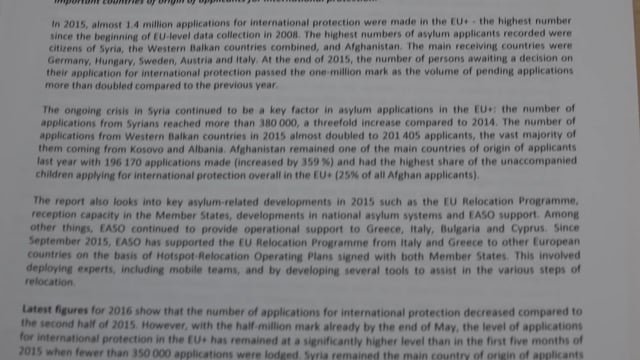[WATCH] Malta-based EASO to become official agency, increase workforce to 500
Changes to European asylum system to increase centralization of solutions to migration crisis


Changes in the Common European Asylum System and the member states’ handling of the current migration crisis will see a centralization of relocation and returns policies, as well as responsibilities of borders, a delegation of the European Parliament’s Committee on Civil Liberties, Justice and Home Affairs said during a press conference today.
The delegation, consisting of MEP Cecile Kashetu Kyenge, MEP Helga Stevens, MEP Carlos Coelho and Maltese MEP Miriam Dalli joined EASO Executive Director Jose Carreira to visit the European Asylum Support Office (EASO) in Malta.
Carreira explained that over the last year, Europe and the EU has faced extraordinary challenges to migration and asylum, with unprecedented numbers of refugees making it into member states.
“The proposed new EASO regulation will effectively convert EASO into an official EU agency, meaning that it will have further operational capacities,” Carreira said, explaining that the workforce of the agency would rise from 100 to 500 people.
“This will allow us to assist member states, and to deploy more professionals to hotspots in Greece and Italy among others, to better process asylum applications,” Carreira said, pointing out that Frontex estimates placed illegal border crossing estimates to up to 2 million in 2015, with some 1.5 million applying for asylum during the same year. He added that 2016 had already seen some half a million applications by the end of May.
“The stock of unprocessed applications is still close to one million, but the flows of migrants from Turkey has decreased,” he said, adding that EASO had been actively targeting refugees stranded in Greece to provide applications.
Carreira also pointed out that the new act would see the agency’s distribution capacity increase considerably, with additionally focused training programmes given to employees.
Head of delegation MEP Cecile Kashetu Kyenge, noted that Malta would soon become an important enforcer of the work carried out by EASO, as it took presidency of the EU Council.
She explained that those present hailed from different parties, but added that the European Parliament is going through a series of necessary reforms in its attitude to migration and in the functions of EASO.
“The principle of solidarity and of equal division of responsibility is at the heart of these reforms,” she said. The point was also taken up by Maltese MEP Miriam Dalli who stressed that solidarity would continue to underly discussions of the crisis, but that it should be the natural response for all member states rather than just frontline countries.
“Until we have a proper, holistic migration policy, we will continue to witness deaths, but the interantional community also has a role to play in this,” she said, adding that the impetus ought to be to save lives both in the countries in question and of migrants.
Dalli pointed out that solidarity ought to govern all discussions of relocation and returns policies, focusing on providing humanitarian ways for people to make it into European countries and to be sent back in case they do not qualify for protection.
Kyenge also pointed out that among the other proposed changes, were changes to the Dublin III agreement, to create a centralised system rather than propagate the idea of first arrival points and national responsibility of these countries.
“The responsibility has to lie on all the 28 member states,” she said, adding that relocation programmes ought to be respected and seen through even though progress was slow.
She further explained that the European commission would also be issuing a policy document for integration, rather than just focusing on receiving refugees.
MEP Carlos Coelho stressed that the crisis being faced required a coherent European voice and that the new regulations would ensure an agency with more competences and human and operational capabilities.
“We already have free movement and common justice, as well as a common response to terrorism and organized crime,” he said, stressing that that was the reasoning behind a common European Asylum system.
MEP Helga Stevens pointed out the importance of drawing a distinction between economic refugees and refugees felling war and conflict.
“We must be discerning about the economic migrants we allow to enter the EU,” she said, adding that social benefit systems should not be an incentive for people to leave their countries.
She further emphasized the need to deal with problems at their root and eliminate push factors causing people to leave the country.
She stressed that in the short term, the EU could establish agreements similar to the one in place with Turkey in countries like Libya, Tunisia and Algeria among others.






.jpg)













.jpeg)


